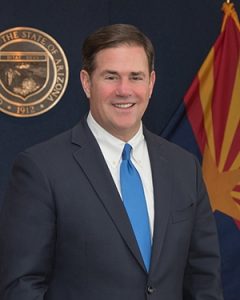As students return to the classroom, bridging the digital divide is on everyone’s mind. Those suffering the deepest losses in learning are students who had little or no access to fast, reliable internet during Covid-19.
Schools, non-profits, businesses and government agencies in Arizona all rushed in to connect as many students as possible but the pandemic highlighted how critical technology is to the nation’s learners. State and federal officials have been working to improve access for underserved students and communities, including two programs announced this week.

In Arizona, Governor Doug Ducey signed a bill Tuesday to pave the way to push more broadband into underserved rural areas and tribal lands. The bill, House Bill 2596, allows private broadband providers to install, operate and maintain telecommunications equipment within the Arizona Department of Transportation’s (ADOT) rights-of-way.
HB 2596 also allows ADOT to grant access to its own broadband conduit to private telecommunications companies in a “non-exclusive and non-discriminatory manner” to reduce the cost of installing broadband infrastructure in rural areas and tribal areas, the Governor’s Office said.
“Arizona is growing and people are moving here at a record pace — and we need to ensure all parts of our booming state are connected,” Gov. Ducey said, echoing the commitment he made during his State-of-the-State address in January. “House Bill 2596 does that, and it will help Arizonans living in rural and tribal areas gain access to fast, affordable and reliable internet.”
Financial incentives for telecommunications companies
In January, Ducey released a broadband proposal that calls for investing $33.1 million to deploy approximately 195 miles of broadband conduit along I-40 to the California border and a number of other projects to accelerate broadband expansion.

To generate revenue for projects, HB 2596 creates the “Smart Highway Trust Fund.” The fund will collect leasing revenues generated from the use of ADOT rights-of-way to be used for operation and maintenance of telecommunications facilities within those rights-of-way.
The hope is to encourage companies to invest in the infrastructure required to wire remote areas like the Navajo Nation in Northern Arizona, where poles and lines can stretch for hundreds of miles.
State Rep. Regina Cobb (R-Kingman), who sponsored the bill, said Covid-19 created even more urgency to get Arizona fully connected.
“Connectivity is key, especially as more people work from home and rely on quality broadband,” Cobb said. “Arizonans in all areas, including rural areas, depend on high-speed internet for education, work, medical needs, transportation, public safety and so much more.”
FCC program open today with discounts for internet bill, tech purchases
The Federal Communications Commission (FCC) also announced a new program that opens today to help low-income households get reliable high-speed internet. Called the Emergency Broadband Benefit, it offers temporary discounts on broadband service and technology purchases to eligible families and students.
Who Is eligible for the discounts?
A household is eligible if a member of the household meets one of the criteria below:
- Has an income that is at or below 135 percent of the Federal Poverty Guidelines or participates in certain assistance programs, such as SNAP, Medicaid, or Lifeline
- Approved to receive benefits under the free and reduced-price school lunch program or the school breakfast program, including through the USDA Community Eligibility Provision in the 2019-2020 or 2020-2021 school year
- Received a Federal Pell Grant during the current award year
- Experienced a substantial loss of income due to job loss or furlough since February 29, 2020 and the household had a total income in 2020 at or below $99,000 for single filers and $198,000 for joint filers
- Meets the eligibility criteria for a participating provider’s existing low-income or COVID-19 program
Enrollment starts today
As of today, May 12, eligible households may enroll in the program to receive a monthly discount off the cost of broadband service from an approved provider.
Eligible households can enroll through an approved provider or by visiting: getemergencybroadband.org.
To read more about broadband programs, grants and other resources available in Arizona, visit: Arizona broadband expansion.
















Add comment